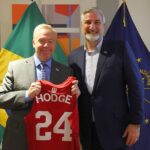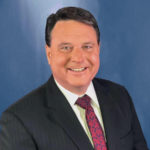 10/7/10 Lead scientist Dr. Steven Curley and Executive Director Mark Neidig of the Kanzius Cancer Research Foundation (KCRF) took the wave to Capitol Hill earlier this week as they convened with several members of the D.C. health and science community to discuss the latest developments in noninvasive ways to treat and control cancers. Neidig and Dr. Curley led an educational seminar on Capitol Hill with health representatives from the U.S. House and Senate, met with former Governor of Pennsylvania and former Cabinet Secretary and Erie native Tom Ridge, and continued outreach with an informational meeting amongst key constituents from Cure Search for Children’s Cancer and the American Cancer Society.
10/7/10 Lead scientist Dr. Steven Curley and Executive Director Mark Neidig of the Kanzius Cancer Research Foundation (KCRF) took the wave to Capitol Hill earlier this week as they convened with several members of the D.C. health and science community to discuss the latest developments in noninvasive ways to treat and control cancers. Neidig and Dr. Curley led an educational seminar on Capitol Hill with health representatives from the U.S. House and Senate, met with former Governor of Pennsylvania and former Cabinet Secretary and Erie native Tom Ridge, and continued outreach with an informational meeting amongst key constituents from Cure Search for Children’s Cancer and the American Cancer Society.
The educational seminar and meetings throughout the day focused on sharing the Foundation’s most recent developments in clinical trials, using nanoparticle and radio wave technology and devices to treat and control cancers without producing the side effects associated with chemotherapy. Specifically, in early tests on small animals, researchers have been able to treat pancreatic and liver cancers very successfully with no damaging effects or toxicities to the surrounding cells.
“Today we made great strides in spreading the wave nationally,” said Neidig. “Our interaction with organizations such as The American Cancer Society and Cure Search for Children’s Cancer opens up future opportunities with other organizations that fight the battle against cancer. Updating elected officials, congressional staff and national influencers like Tom Ridge is an important part of growing the Foundation and keeping the research on track.”
Neidig is a 1978 graduate of PHS. He has been a guest on the “What’s Your Opinion Show” on WTCA many times. He will be in the studio this Friday and WTCA will host a 3-hour radio-a-thon to help raise money for the foundation. Listeners are urged to call in and make donations to the foundation in memory of a loved one lost to this dreaded disease or in honor of someone near and dear that surived their battle with cancer. The radio station will also be conducting a radio auction during the 3 hour event and is urging listeners to call in and talk about their experiences with cancer, expecially the treatments.
For an overview of the latest research and clinical trials completed by Dr. Steven Curley and the research team at the Kanzius Cancer Research Foundation visit http://kanzius.org. Any individual can support the Foundation’s efforts through general donations or giving in the memory or honor of someone.
###
About the John Kanzius Cancer Research Foundation
The Kanzius Cancer Research Foundation is a 501(c)(3) non-profit organization with a mission to create regional and national awareness of the potential of the Kanzius Radiowave Treatment Project and to help accelerate the speed at which this research progresses. The goal of the KCRF is to raise money to support ongoing research. Pancreatic, liver and colorectal cancers in laboratory animals are undergoing extensive research in Houston and sophisticated radio transmission equipment is being manufactured at Industrial Sales and Manufacturing, Inc. in Erie, Pennsylvania.
About John Kanzius & Radiowave Treatment Research
John Kanzius (1944-2009) was a cancer patient who spent his entire life in broadcast engineering, management, and ownership. When he was diagnosed with a rare form of B-cell leukemia in 2002, he began to draw on his knowledge of broadcast and electrical engineering to envision a better way to treat cancer using physics and the use of noninvasive radio frequency waves. John’s efforts have been supported by The University of Pittsburgh, The University of Texas MD Anderson Cancer Center in Houston, and the late Richard Smalley, a Nobel Laureate who won the Nobel Prize for his work with carbon nanoparticles. In 2008, clinical trials proved that pancreatic, liver, and colorectal cancer in small animals can be cured by the Kanzius Radio Frequency Treatment. KCRF’s Dr. Steven Curley also began discussions with the FDA in February 2009 to obtain approval for human clinical trials and met with them again in early May to develop a timeline.














